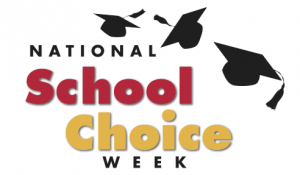In just four short years, National School Choice Week has mushroomed nationwide from 150 events in 2010 to 5,500 at last count this year, with much of the growth attributed to a positive message and a powerful way of delivering it.
 “We don’t want to tell anyone that one choice is better than another one,’’ Andrew Campanella, president of National School Choice Week, told redefinED recently. Instead, “we’re celebrating effective education options for kids.’’
“We don’t want to tell anyone that one choice is better than another one,’’ Andrew Campanella, president of National School Choice Week, told redefinED recently. Instead, “we’re celebrating effective education options for kids.’’
From traditional schools to magnet programs, charter and private schools, faith-based education, online learning and homeschooling – it’s all good as long as parents get to choose what’s best for their child, he said.
The 2014 celebration officially kicks off Jan. 26, but a 14-city train and motor coach tour begins in Newark on Jan. 22 and ends, 3,800 miles later, in San Francisco. The “whistle-stop’’ tour is modeled after historic tours in American history that brought attention to issues of national concern, such as women’s rights and civil rights.
It’s all part of a plan to “show America that there are so many choices out there,’’ said Campanella, who listed Florida, Indiana, Louisiana and Ohio among the states with good school choice track records. But, he added, “I think every state has room for growth.’’
Parents, students and teachers will share their stories at tour stops and during independent events organized and paid for by school districts, private school organizations, grassroots groups and individuals. Some events will be as elaborate as a panel discussion on the 60th anniversary of Brown vs. the Board of Education in Coral Springs, Fla., and as simple as a showing of a school choice film in someone’s living room, Campanella said.
National School Choice Week also is an opportunity for education providers to focus not on competing with one another, but on their shared goal: to help children learn.
“I see a natural tension between anyone who is going to compete,’’ Campanella said. “But my hope is that they can come together on the basics.’’
A student of traditional public schools “my whole life,’’ and the son of a district school teacher, Campanella said he bristles when he hears people characterize school choice as being at odds with public education.
“People are really talking down the traditional system,’’ he said. “They need to have more confidence in their traditional public schools.’’